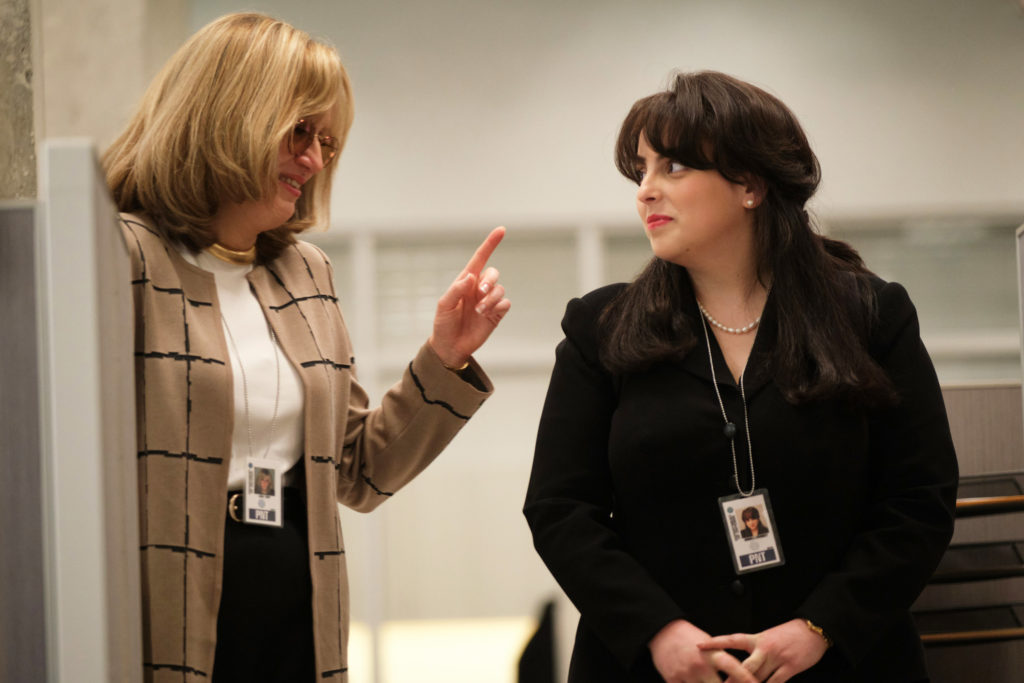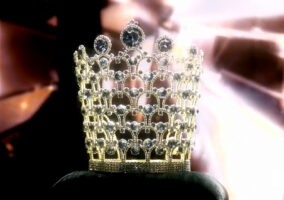
Impeachment: American Crime Story, Ryan Murphy’s take on the Clinton scandals of the 1990s, premieres tonight on FX. We were of two minds about it, which is good, since there are two of us. Lorenzo found it utterly engrossing to watch the infamously public and over-mediated story play out privately, from the intimate perspectives of several of the people involved. Sometimes it’s easy to forget that even hugely important, widely discussed news stories and scandals are made up of real people, living real lives. Impeachment more than delivers on that idea, centering most of the story on the lives of the two relatively unassuming women at the center of it: Monica Lewinsky and Linda Tripp.
Lewinsky, played here by a luminous Beanie Feldstein in a star-making turn, is presented as a young woman who’s desperate to appear worldly and cynical, but who is clearly revealed to be naïve and immature. Tripp, played by Murphy muse Sarah Paulson in several sizes’ worth of padding and a distracting amount of facial prosthetics, is presented as an extremely bitter and sour woman who spent her life on the edges of power and ultimately wants to be respected as a major player herself. The tension between these two women, especially once Tripp makes the decision to start taping her conversations with Lewinsky is exquisitely portrayed. It’s painful to watch Lewinsky be so foolishly trusting of a figure who so clearly doesn’t have her interests at heart (not to mention so utterly lost in her obsession with a powerful man who’d just as soon toss her aside than deal with her as a person). Paulson is almost certainly going to get awards buzz for a finely calibrated performance that nonetheless comes off a little showy at times. As good as Paulson is, there are more than a few times when the tics and body language didn’t so much give the impression of a bitter, beaten-down woman as they did an actress doing an impersonation of same. Paulson takes over for Feldstein as the lead for a few hours of the story, making her performance central to the entire series. Some will find it a tour de force and some will find it extremely distracting. We liken it to Gillian Anderson’s turn as Margaret Thatcher in The Crown; a performance so full of tics and affectations that you either felt was impossible to fully get invested in or was a master class in acting technique. It should be noted that Anderson’s turn was widely rewarded (including an Emmy nomination) and also that she did it without the aid of makeup effects.
The thing is, if you’re going to base your entire story on the idea that Linda Tripp was a very bitter and sour woman with a vindictive streak, and if you’re going to root her feelings in a lifelong sense of being disregarded and passed over, it seems to us that you have to explore the idea that part of her bitterness and part of the reason she felt mistreated came down to how she looked. The media portrayal of Tripp at the time was horrifyingly vicious and you really can’t tell her story without exploring that aspect of it. No matter how much Sarah Paulson can do in terms of getting inside a character’s head, she will never truly know what it’s like to move through the world being treated as a plus-size woman who’s considered ugly. Without naming any, there are countless character actresses who know what it’s like to be perceived as a Linda Tripp in the world and we think almost any one on the same skill level as Paulson would easily be able to find things in the character that she simply cannot. It’s a very good performance, but there’s no denying it’s lacking a sense of truth to it. This might seem nitpicky as hell, but one of us has actually gone through life as an overweight person (a term we’ll reserve only for ourselves) and Paulson’s tiny head and delicate hands sticking out from under all that padding was extremely distracting.
There are times when it feels like the series is just ticking off bits of history from a checklist, although the ’90s (Murphy’s clearest and longest-running obsession) are evoked perfectly, without being obvious about it; there are almost no ’90s needle drops, for instance. We imagine the series might be more engrossing to the generation of adults who weren’t adults (or existent) at the time, but if you know the story — and every adult in 1998 knew it whether they wanted to or not — we can’t say this telling of the tale is going to reveal anything new. If anything, it’s notable because of how much it shades over or ignores. There is an admirable attempt to make larger points about sexual harassment and how our understanding of it has changed since the Clinton days, as well as a somewhat half-hearted attempt to explore the birth of the right wing media machine in American politics. But the series occasionally suffers by being timid about what it wants to say. There’s a tendency for every single person who had a vested interest in taking Bill Clinton down, from Kenneth Starr to Lucianne Goldberg (a somewhat wasted Margo Martindale) to Ann Coulter (a surprisingly good Cobie Smulders) to Linda Tripp, to constantly voice their outrage on behalf of “the women,” with very little screen time given over to the idea that their motives for taking down Clinton weren’t necessarily that pure. Similarly, Clinton himself appears as more of a ghostly figure (Hillary barely appears at all) who is portrayed as both very charming and deviously self-aware of what he’s doing, but the series seems to want to go out of its way to blur the lines on what he did.
Monica Lewinsky was a producer and consultant here and if there’s any real selling point to the series, it’s the idea that she is finally getting the chance to tell the story her way, from her perspective (hence the ghostly Clinton and non-existent Hillary). We believe she did what she wanted and got what she wanted out of this series, but we don’t know if we can find anything new about her perspective – except that the series makes it perfectly clear that Linda Tripp is, in Monica’s own words during the opening scene of the first episode, a “treacherous bitch.” Lewinsky has mentioned in several interviews that she “fought” to show the scene where she flashed her thong at Clinton in the White House and the moment is so demure and tastefully presented that at first, we didn’t even realize until well after it was over that we had watched the infamous moment play out. Granted, we don’t think a lurid take on these events would necessarily be called for, but if you were watching this without any preconceptions about the story, you’d think it was about a young girl with a crush on an older man who indulged her in a tasteful and supportive manner. Bill Clinton famously tried to use lawyerly language to claim that he “did not have sexual relations with that woman” and going by what Impeachment is willing to convey, you might walk away thinking the same thing.
We wanted to be annoyed by Clive Owen’s performance because his prosthetics were almost as intrusive as Sarah Paulson’s, but he does a great job of giving Clinton that measure of kindliness and menace that a story like this is going to require. Still, he sits alongside Paulson somewhere in the uncanny valley region; not so much looking like Bill Clinton as he does looking like Bill Clinton wearing facial prosthetics for some reason. In the end, we think it’s super-gimmicky to rely on so much padding and prosthetics to tell the stories of real, highly recognizable people. On the other hand, Annaleigh Ashford is astonishingly good as Paula Jones and if anyone deserves awards recognition (aside from Feldstein herself), it’s her.
We don’t give ratings in our reviews, but since this one is coming off so mixed, we’d like to state affirmatively that this series is about a B+ to an A- in terms of its quality and watchability. The cast is pretty great, the story is undoubtedly engrossing, and the telling of it tries to say larger things about the world we live in now. Sometimes it even succeeds at saying those things. But it doesn’t manage to recast our understanding of that era and we think it pulls back at times from saying harsher things about almost everyone involved.
Venice Film Festival: Penélope Cruz and Antonio Banderas at the “Official Competition” Premiere Next Post:
New York Fashion Week: Christian Siriano Spring 2022 Collection
Please review our Community Guidelines before posting a comment. Thank you!



